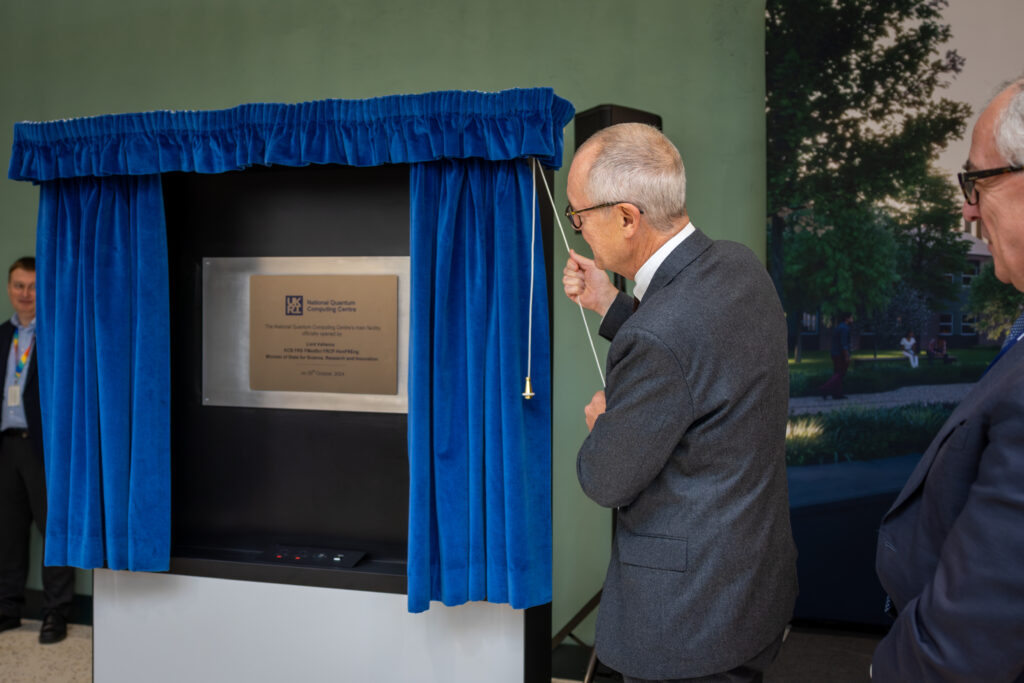
UK National Quantum Computing Centre opens at Harwell
The National Quantum Computing Centre (NQCC), a new national laboratory dedicated to accelerating development of quantum computing for the UK, has been formally opened by Minister of Science, Research and Innovation, Lord Vallance.
The NQCC will ensure that the UK remains internationally competitive in a critical and transformative technology set to underpin future economic prosperity and national resilience.
There are 12 quantum computers in development at the NQCC’s premises at Harwell, Oxfordshire including the new 4,000 square metre purpose-built site.
Eight are led by private companies and four by NQCC scientists.
These will play a pivotal role in delivering the UK’s strategic ambition for quantum technologies.
Lord Vallance said at the opening:
“The National Quantum Computing Centre marks a vital step forward in the UK’s efforts to advance quantum technologies. By making its facilities available to users from across industry and academia, and with its focus on making quantum computers practically useable at scale, this Centre will help them solve some of the biggest challenges we face, whether it’s delivering advances in healthcare, enhancing energy efficiency, tackling climate change, or inventing new materials.
The innovations that will emerge from the work the NQCC will do will ultimately improve lives across the country and ensure the UK seizes the economic benefits of its leadership in quantum technologies.”

Quantum computers operate in a fundamentally different way to conventional digital computers.
Quantum computing is based on harnessing effects that exist at the level of atoms, electrons and photons.
Its calculations involve encoding and processing information by controlling quantum states, relying on the uniquely quantum phenomena of superposition and entanglement.
Quantum computers have the potential to meet challenges with an exponentially increased computational power beyond the reach of even the most advanced current supercomputers.
Potential applications range from:
- Optimising energy distribution in power grids by improving efficiency and reliability
- Accelerating drug discovery
- Predicting climate patterns more accurately through advanced data analysis
- Improving use of AI in fields such as medical diagnostics and fraud detection
UKRI Chief Executive, Professor Dame Ottoline Leyser, said:
“With our rich national heritage in quantum computing research the UK is well-placed to lead the development of this transformative new technology, which has such huge potential across society and the economy.
“The UK National Quantum Computing Centre is central to this critical work, bringing together internationally-leading researchers and technologists from across academia and industry to ensure that the UK’s quantum computing ecosystem thrives, delivering benefits to people across the UK and beyond.”
The NQCC is supported through an initial £93 million UKRI investment, delivered through EPSRC and STFC.
The NQCC has attracted further UKRI funding of £50 million to enhance the delivery of its mission which includes investment through the UKRI Technology Missions Fund.
Playing an integral role within the UK National Quantum Technology Strategy, the new facility will ensure that the UK continues to lead vital research and development on hardware, software and applications. These will be delivered through partnerships across government, industry and the research community.
The NQCC is designed to provide the necessary infrastructure and environment in which to design, build, operate and host a wide range of quantum computers.
The NQCC is aiming to showcase, demonstrate and evaluate the capabilities of the prototype quantum computers (‘testbeds’) currently being deployed at the new facility.
A key focus will be to identify and overcome critical challenges that stand in the way of developing scalable quantum processors that can run complex computational tasks.
NQCC Director, Dr Michael Cuthbert, said:
“The inauguration of the National Quantum Computing Centre is an important milestone for the UK that reinforces our commitment to advancing quantum technology and fostering collaboration.
“This state-of-the-art facility will serve as a hub for innovation, bringing together researchers, businesses, and stakeholders to unlock the transformative potential of quantum computing for the future.
“I am incredibly proud of our team and our construction partners who have worked tirelessly to create such an outstanding facility enabling this amazing technology.”
The NQCC will also act as a hub for innovation, training and technical support that can be made accessible to businesses across the UK.
It aims to foster a vibrant environment to promote collaboration between researchers and technologists, attracting visitors and industry interest from across the UK and internationally.
The NQCC’s user engagement programme, SparQ, is working across the UK economy to create a user community that can unlock the potential of quantum computing for practical applications in key priority sectors such as energy, climate, healthcare, and financial services. It is also seeking new sectors.
Notes to Editors:
The 12 quantum computers currently in development at the NQCC:
- 7 testbeds (funded through NQCC)
- 1 IDRA project with Nu Quantum
- 1 Orca PT1 for MoD/DSTL
- 3 NQCC-owned (Ion-trap, superconducting and Cold Atom Quantum Computing)
About NQCC: The NQCC is a national centre that focuses on translating UK research into innovation. The centre is addressing the key engineering challenges involved with scaling quantum computers. It is engaging with industry, government and the research community to support the growth of the UK’s quantum computing ecosystem. The NQCC is part of the £1 billion UK National Quantum Technologies Programme (NQTP), of which UKRI is a major partner. The NQTP’s aim is to ensure the successful transition of quantum technologies from the laboratory to new products and services.